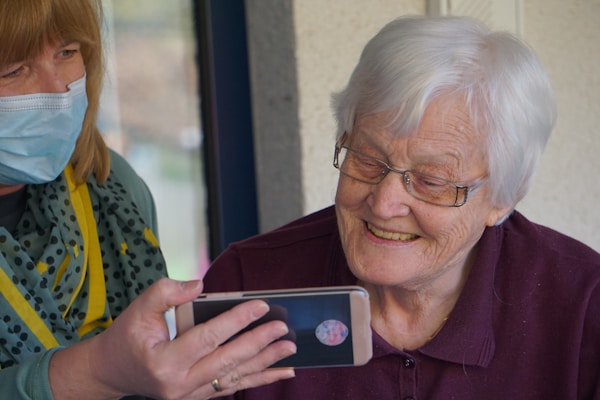The middle stages of dementia are typically the longest and can last for many years. As dementia progresses, the person with the disease will require a greater level of care. The middle stages of dementia can be especially challenging for both the person with the disease and their loved ones. During this time, damage to the brain can make it difficult to express thoughts and perform routine tasks. As a caregiver, providing support and creating a safe environment is important.
A person with stage four dementia will likely need permanent care and around-the-clock help. There will be challenging days, but there will also be good days. Let’s take a look at some tips for caring for someone with middle-stage dementia.
Create a routine.

It can be challenging for caregivers to establish and maintain a routine for someone with dementia. This is because the disease can cause significant changes in a person’s behavior, mood, and ability to perform everyday tasks. However, establishing a routine can be very beneficial for someone with dementia. It can help them feel more comfortable and secure, and it can reinforce a sense of familiarity in their daily life.
You should try to avoid making significant changes to a routine, as this can be confusing for someone with cognitive decline. Sometimes, there are changes that are unavoidable, such as introducing a new care provider or switching care settings. However, individuals with dementia often require time to adjust to new people and places, so you should try to implement changes gradually.
Caregivers can do a few things to help establish and maintain a routine. First, you should try to get to know the person’s preferences and habits as much as possible. This will help you create a routine that is tailored to the person’s individual needs. It is also important to be patient and flexible, as dementia can cause sudden changes in a person’s routine.
Promote ongoing communication.

Patients with dementia may experience difficulty communicating with others. They may have difficulty interpreting or remembering specific words. They may also lose their train of thought in the middle of a sentence frequently. However, promoting ongoing communication can give the person a chance to participate in conversations and activities and keep them engaged. Research also indicates that social interaction can have a positive impact on memory.
There is no one-size-fits-all approach to communicating with someone who has middle-stage dementia, as each person’s needs and abilities will vary. However, some general tips may be helpful. Caregivers should try to meet the person where they are. It’s important not to try to force the person to understand or remember things that they are no longer able to. Instead, focus on meeting them where they are currently in terms of their cognition and communication.
It’s also helpful to simplify conversations. Keeping conversations short, simple, and direct will be beneficial. Similar to speaking with anyone else, you’ll want to make sure to make eye contact when communicating. Sometimes, it can also be helpful to use visual aids such as pictures or drawings when communicating with the person.
Assist with daily care needs.

There is no set standard for what people will need at different stages of dementia. This is because the disease impacts people differently. However, as dementia progresses, the ability to handle daily tasks and personal care will decline. When dressing, you can give direction indirectly by laying out clothing in the order in which they should be put on. For example, you might place a shirt on the bed and pants on a chair or hang a dress on a hook. This will help the person with dementia know where everything goes. If help is still needed, you can do things like help with buttons and zippers or help the person step into clothing.
Grooming can also be a challenge for someone with dementia. Simple tasks like brushing teeth and hair can become difficult. Often, it is best to keep grooming tasks simple. For example, you might want to focus on brushing teeth and using a comb or hairbrush. Additionally, eating can be a challenge for someone with dementia. It can be difficult to chew and swallow food. You can help by providing bite-sized, simple snacks and food. You might also want to avoid crunchy or tough foods. And finally, make sure the person has plenty of time to eat.
During the middle stages of cognitive decline, it will become too difficult or dangerous for a person with dementia to be left alone. As a result, you will need to provide long-term care. It’s important to be patient and understanding with someone who has dementia and to provide them with a calm and supportive environment.
Conclusion
The middle stages of dementia are typically the longest and can last for many years. As dementia progresses, the person with the disease will require a greater level of care. There will be challenging days, but there will also be good days. Let’s take a look at some tips for caring for someone with middle-stage dementia. It can be challenging for caregivers to establish and maintain a routine for someone with dementia. You should try to avoid making significant changes to a routine, as this can be confusing for someone with cognitive decline. However, individuals with dementia often require time to adjust to new people and places, so you should try to implement changes gradually. Caregivers can do a few things to help establish and maintain a routine. Patients with dementia may experience difficulty communicating with others. However, promoting ongoing communication can give the person a chance to participate in conversations and activities and keep them engaged. There is no one-size-fits-all approach to communicating with someone who has middle-stage dementia, as each person’s needs and abilities will vary. It’s also helpful to simplify conversations. Similar to speaking with anyone else, you’ll want to make sure to make eye contact when communicating. This is because the disease impacts people differently. However, as dementia progresses, the ability to handle daily tasks and personal care will decline. Grooming can also be a challenge for someone with dementia. During the middle stages of cognitive decline, it will become too difficult or dangerous for a person with dementia to be left alone. It’s important to be patient and understanding with someone who has dementia and to provide them with a calm and supportive environment.













